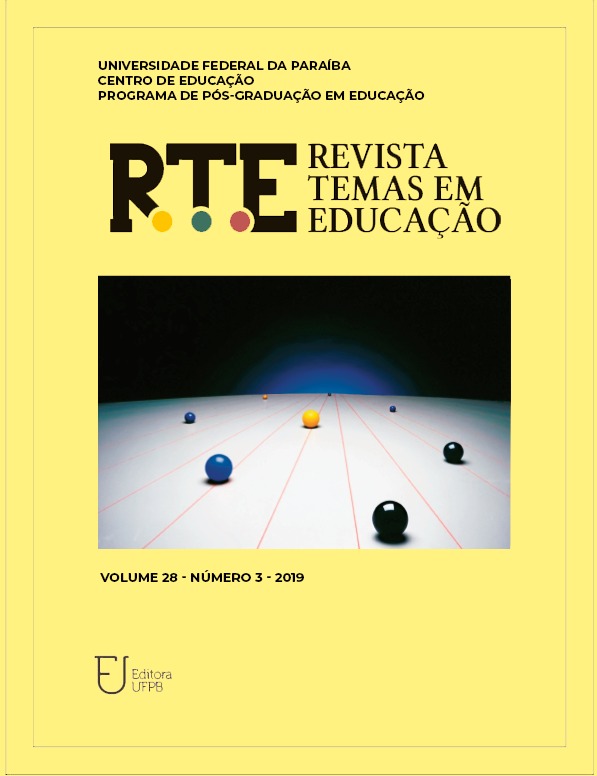BODY AND DIGITAL TECHNOLOGIES: GENDER IMPLICATIONS IN FEMALE SOCCER
BODY AND DIGITAL TECHNOLOGIES: GENDER IMPLICATIONS IN FEMALE SOCCER
DOI:
https://doi.org/10.22478/ufpb.2359-7003.2019v28n3.47693Keywords:
Body, Cultural Pedagogies, Digital technologies, Cultural Studies, GenderAbstract
Football, as well as other physical activities, was culturally constructed through a binary that divides society into two blocks: men on one side and women on the other. Among distinct sociocultural spaces, there are subjects who choose to blur the boundaries of a coherent logic (seen as) between sex and gender and decide to [res] signify their place of men and women outside the patterns scanned by culture and society. Given this, our goal is to understand how the inclusion of women in soccer games reverberates in sexist discourses on social networks. Methodologically, this research is inscribed as qualitative, documentary, with interface between the Studies of Gender and Sexuality [s] and the field of Cultural Studies of Education. For this text, we chose Facebook as a starting point for the analysis, understanding it as a Cultural Pedagogy in the constitution of gender and sexuality crossings that are located in the chosen images and in the comments of the Internet users, making the publications about the Women's World Cup 2019 spaces of sociability and education around the possibilities of experiencing gender and / or sexuality [s] of these bodies - read as feminine - and that enter the field fleeing the rules pre-defined by culture.
Downloads
References
ANDRADE, Paula Deporte de; COSTA, Maria Vorraber. Usos e possibilidades do conceito de pedagogias culturais nas pesquisas em estudos culturais em educação. Textura, Canoas, v. 17, n. 34, p. 48-63, mai./ago. 2015.
CONNEL, Robert W; MESSERSCHIMIDT, James W. Masculinidade hegemônica: repensando o conceito. Rev. Estud. Fem., Florianópolis, v. 21, n. 1, p. 241-282, jan./abr., 2013.
COSTA, Marisa Vorraber; ANDRADE, Paula Deporte de. Na produtiva confluência entre educação e comunicação, as pedagogias culturais contemporâneas. Perspectiva, Florianópolis, v. 33, n. 2, p. 843-862, maio/ago., 2015.
COSTA, Ana; BONFIM, Flavia. Um percurso sobre o falo na psicanálise: primazia, querela, significante e objeto a. Ágora, Rio de Janeiro, v. XVII n. 2 jul./dez., 2014 229-245.
DUNNING, Eric. “Figurando” o esporte moderno: algumas reflexões sobre esporte, violência e civilização com referência especial ao futebol. Revista de Ciências Sociais, Fortaleza, v. 42, n. 1, jan./jun., 2011, p. 11-26.
FÉLIX, Jeane. “Quer teclar?”: aprendizagens sobre juventudes e soropositividades através de bate-papos virtuais. Tese (Doutorado em Educação) – Faculdade de Educação, Universidade Federal do Rio Grande do Sul. Porto Alegre, 2012.
FONTANELLA, F. O que é um meme?: proposta para uma problemática da memesfera. In: SIMPÓSIO NACIONAL ABCIBER, 3, ESPM, São Paulo, 16-18 de novembro de 2009. Anais... São Paulo: ESPM, 2009.
GOELLNER, Silvana Vilodre. A produção cultural do corpo. In. LOURO, Guacira Lopes; FELIPE, Jane; GOELLNER, Silvana Vilodre (Orgs). Corpo, gênero e sexualidade: um debate contemporâneo na educação. 9 ed. Petrópolis, RJ: Vozes, 2013.
______. Mulheres e futebol no Brasil: entre sombras e visibilidades. Revista Brasileira de Educação Física e Esporte, São Paulo, v.19, n.2, p.143-151, abr./jun. 2005.
HALL, Stuart. A identidade cultural na pós-modernidade. (Tradução de Tomaz Tadeu da Silva & Guacira Lopes Louro). 12 ed. Rio de Janeiro, Lamparina, 2019.
HIRATA, Helena; KERGOAT, Daniele. Novas configurações da divisão sexual do trabalho. Cadernos de Pesquisa, v. 37, n. 132, set./dez. 2007.
HORTA, Natália Botelho. O meme como linguagem da internet: uma perspectiva semiótica. 2015. 191 f. Dissertação (Mestrado em Comunicação) – Universidade de Brasília, Faculdade de Comunicação, Brasília, 2015.
LAURETIS, Teresa de. A tecnologia do gênero. In: HOLLANDA, Heloísa Buarque de. (org). Tendências e impasses: O feminismo como crítica da cultura. Rio de Janeiro: Rocco, 1994. p. 206-24.
LOURO, Guacira Lopes. Corpo, escola e identidade. Educação & Realidade, v. 25, n. 2, p. 59-76, jul./dez., 2000.
______. Gênero, sexualidade e educação: uma perspectiva pós-estruturalista. 7. ed. Petrópolis, RJ: Vozes, 1997.
MAGALHÃES, Lívia Gonçalves. Histórias do futebol. São Paulo: Arquivo Público do Estado, 2010. (Coleção Ensino & Memória, 1).
MARTÍN-BARBERO, Jesús. A comunicação na educação. (Tradução de Maria Immacolata Vassallo de Lopes e Dafne Melo). São Paulo: Contexto, 2014.
MEYER, Dagmar Elisabeth Estermann. Teorias e políticas de gênero: fragmentos históricos e desafios atuais. Revista Brasileira de Enfermagem, v. 57, n. 1, p. 13-18, 2004.
______. Gênero e educação: teoria e política. In: LOURO, Guacira Lopes; NECKEL, Jane Felipe; GOELLNER, Silvana Vilodre (Orgs.). Corpo, gênero e sexualidade: um debate contemporâneo na educação. Petrópolis, RJ: Vozes, 2003, p. 09-27.
MORÃO, Ludmila; MOREL, Marcia. As narrativas sobre o futebol feminino: o discurso da mídia impressa em campo. Revista Brasileira de Ciência do Esporte, Campinas, v.26, n.2, p.73-86, jan.2005.
SILVA, Elizabete Rodrigues da. A (in)visibilidade das mulheres no campo científico. Revista HISTEDBR On-line, Campinas, n.30, p.133-148, jun.2008.
WOODWARD, Kathryn. Identidade e diferença: uma introdução teórica e conceitual. In: SILVA, Tomaz Tadeu da (org.). Identidade e diferença: a perspectiva dos Estudos Culturais. Petrópolis, RJ: Vozes, 2014. p. 7-72.
Downloads
Published
How to Cite
Issue
Section
License
Authors who publish in this journal agree to the following terms:
. Authors retain the copyright and grant the journal the right to first publication, with the work simultaneously licensed under the Licença Creative Commons Attribution that allows the sharing of the work with acknowledgment of authorship and initial publication in this magazine. . Authors are authorized to assume additional contracts separately, for non-exclusive distribution of the version of the work published in this journal (eg, publishing in institutional repository or as a book chapter), with acknowledgment of authorship and initial publication in this journal.
. Authors are permitted and encouraged to publish and distribute their work online (eg in institutional repositories or on their personal page) at any point before or during the editorial process, as this can generate productive changes, as well as increase impact and citation of the published work (See O Efeito do Acesso Livre).



















